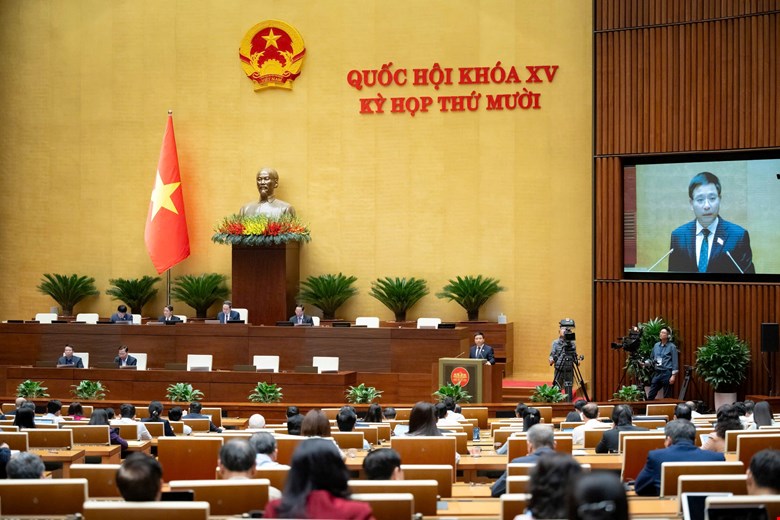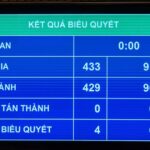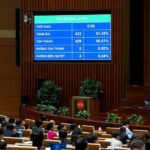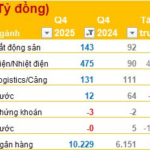On the afternoon of November 14th, continuing the agenda of the 10th session, the National Assembly voted to adopt the Resolution on the allocation of the central budget for 2026. Accordingly, the National Assembly resolved that the total central budget revenue is 1,225,356 billion VND.

The National Assembly convenes in the afternoon session on November 14th to vote on the Resolution regarding the allocation of the central budget for 2026. Photo: Phạm Thắng
The total central budget expenditure is 1,809,056 billion VND. This includes 238,421 billion VND allocated to balance local budgets; 53,554 billion VND to ensure the implementation of the base salary of 2.34 million VND per month; and 187,175 billion VND for targeted local budget supplements.
For central government agencies and units previously subject to special financial mechanisms under Resolutions No. 104/2023/QH15 and No. 142/2024/QH15 but not yet assigned civil servant staffing quotas, the National Assembly permits the allocation of salaries, contributions, additional income, and regular expenses based on the established norms for these positions.
The National Assembly approves a reserve of 15,000 billion VND to ensure financial security and national safety in case of economic and social fluctuations or if state budget revenue falls short of projections. The Government is tasked with proactive management to minimize the impact on planned expenditures and maintain financial stability.
A budget of 6,496.1 billion VND, equivalent to 85% of the revenue from road traffic order and safety administrative fines collected in 2024, is allocated to the Ministry of Public Security for economic activities. An additional 1,146.3 billion VND (15%) is earmarked for local budgets to support traffic safety initiatives in their respective areas.
The National Assembly also resolves to ensure a minimum allocation of 3% of the total state budget for science, technology, innovation, and digital transformation, with specific distributions to ministries, central agencies, and localities.
Funds are also set aside to adjust salaries, pensions, social insurance benefits, monthly allowances, benefits for beneficiaries, and other social policies as determined by competent authorities.
The National Assembly directs the Government to instruct ministries, central agencies, and provincial authorities to allocate state investment capital in a focused and prioritized manner.
Strict financial discipline and accountability are emphasized, with severe penalties for violations that delay capital allocation and disbursement. Individual accountability for leaders in cases of delayed implementation and disbursement is to be linked to performance evaluations.
The Government is to guide provincial People’s Committees in submitting budget revenue estimates, local budget revenue and expenditure estimates, local budget deficits, total local budget borrowing (including borrowing to cover deficits and repay principal), and budget allocation decisions to the People’s Councils at the same level, in accordance with the State Budget Law.
Vietnam’s National Assembly Targets Over 10% GDP Growth in 2026, Aims for Per Capita GDP of $5,400–$5,500
This morning, during the 10th Session of the 15th National Assembly, the National Assembly voted to adopt the Resolution on the Socio-Economic Development Plan for 2026. With 429 out of 433 participating delegates (90.51%) voting in favor, the National Assembly officially approved the Resolution on the Socio-Economic Development Plan for 2026.
Vietnam’s National Assembly Sets Ambitious 10%+ Economic Growth Target for 2026
On November 13th, with an overwhelming majority of 429 out of 433 votes in favor, the National Assembly adopted a resolution outlining the socio-economic development plan for 2026. This ambitious plan sets a target growth rate of 10% or higher, marking a significant stride towards economic advancement.
Exciting News: Rice Exports, Accounting Services, and 23 Other Industries Proposed by the Government to Operate Without Business Licenses
The government has submitted a draft amendment to the Investment Law to the National Assembly, proposing the elimination of conditional business requirements for 25 sectors, including accounting services and rice exports. This move aims to significantly shift from ex-ante to ex-post inspection, fostering greater business freedom and streamlining regulatory processes.
Revamped Investment Law: Streamlining Business Procedures with Proposed Cuts and Simplifications
The revised Investment Law has been meticulously crafted to institutionalize the resolutions of the Party, effectively addressing institutional and legal bottlenecks. By streamlining and simplifying investment and business procedures, it empowers both citizens and enterprises, fostering a more conducive environment for growth and development.




















